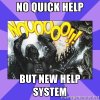Yesterday, when trying to solve some FUQ's (Formerly Unanswered Questions) on these forums, I ran into a couple of "things" with TCC (20.00.25 x64) that didn't work as advertised or expected.
I do no longer report bugs, as they hurt nobody (or else these bugs would have been reported already) and the response (if any at all!) most of the times makes me feel like *I* did something wrong and have to defend myself, which is not something I actively pursue.
Anyway, after 4 or 5 of these issues I started to get annoyed and decided to keep track.
This is the list of approximately 3 hours working with TCC (without the first 4/5 issues, which I already forgot):
Back to non-bug-reporting-mode....
I do no longer report bugs, as they hurt nobody (or else these bugs would have been reported already) and the response (if any at all!) most of the times makes me feel like *I* did something wrong and have to defend myself, which is not something I actively pursue.
Anyway, after 4 or 5 of these issues I started to get annoyed and decided to keep track.
This is the list of approximately 3 hours working with TCC (without the first 4/5 issues, which I already forgot):
- With TASKBAR desktop you can minimize all applications (and thus show the desktop). A second TASKBAR desktop restores the original layout. But after TASKBAR desktop & delay 2 & TASKBAR desktop the cursor is gone. Without a visible prompt you can still type your commands, but [Enter] is impossible (gives error-beep).
The solution is to activate another program (by clicking on it's window) and then back to TCC. Now things work again. The similar built-in Windows functionality (Win-m , Win-Shift-M) works as expected. - @EVAL[10/0] has it's (obvious) error trapped, @EVAL[10\0] and @eval[10 MOD 0] have not.
- @UNC crashes TCC:
- The text in the helpfile regarding internal variables like _LALT, _SHIFT uses "depressed" for the state where the key is in it's lower position. For me - English is not my native language - this was confusing. My guess would be that depressed would mean that the key was NOT pressed (like (de)solder, (de)compress, etc). Only after a little thought I realized depressed=down. And then it made sense. But still: Why not just "pressed", like "Press any key to continue"?
- START /? misses the /TABNA option in the short option list (I get it that it's not in the second part")
- Same goes for WINDOW /? : it misses the DETACH and /FLASH options
- If you have multiple TCC applications running and in one of them you change from global to local history, flush that local history and activate global history after that: the global history is deleted. That means all the other TCC intances now also have an empy (global) history... I assume DIRHISTORY behaves the same (not tested)
- Regarding DIRHISTORY: Why is there no @DIRHISTORY function, like there is a @HISTORY companion for the HISTORY command. Not consistent.
- echo %_expansion returns %_expansion after setdos /x-3 (disable all variable expansion). Seems logical, but not very practical.
- dir /4 does *not* display the output in 4 colums; it displays it in as much colums as possible with the current columnwidth (with a max of 4). Same goes for DIR /2. Redirection (dir /4 > output.txt) still limits the output to the column width of the screen.
In contrast: DIR /W has the right description in the helpfile: "... displays as many columns as it can fit into TCC window ...." - There is no function to get just the path of a filename, like \TEMP\
Luckily there is the CMD-compatible solution :
for %a in ("English.dll") do echo %~da %~pa %~na %~xa gives you:
C: \Program Files\JPSoft\TCCLE14x64\ English .dll (Drive Path Name Extension)
Couldn't get it working with the DO command, though. And it cannot handle this:
for %x in ("English.dll") do echo %~xx
Reply: English.dllx . Should be: .dll - The @FILENAME example in the help should be echo %@filename["%comspec"] instead of ["comspec"]
Back to non-bug-reporting-mode....
Last edited:
